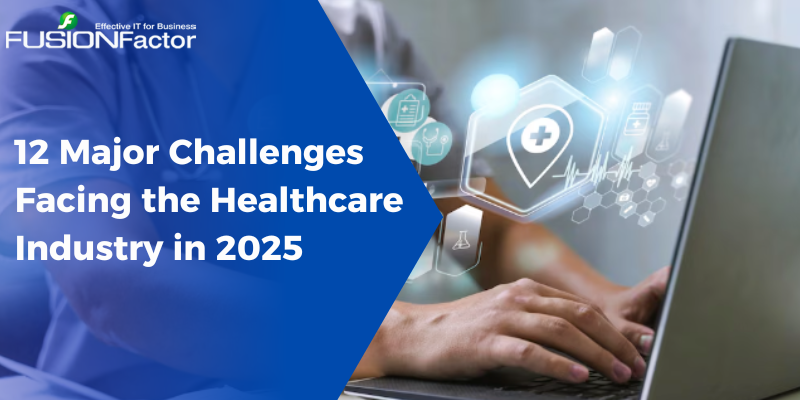
12 Major Challenges Facing the Healthcare Industry in 2025
1. Rampant Cybersecurity Threats
The healthcare sector is the main target for cybercriminals because of the great value of patient data within the dark market. Did you know that the Ransomware attacks can slow down operations completely, holding patient records hostage and directly placing the aspect of care in danger?
The Solution: One of the best solutions is that reactive security is no longer enough. Healthcare organizations require proactive cybersecurity services that also include 24/7 surveillance, advanced threat detection, intrusion prevention systems, and regular security audits. This is to enable the development of a secure wall around their most important assets.
2. Ensuring Strict HIPAA Compliance
Maintaining compliance with HIPAA (and other regulations like GDPR) works like a target in motion. This is all the more relevant when it comes to the latest technologies that are being applied, as most experts agree that the regulatory landscape is ever-evolving. Hence, a single breach can result in a fine of millions of dollars and irreparable reputational damage.
The Solution: Collaborating with an IT support service provider that is well-experienced in healthcare ensures that every segment of technology, ranging from data storage to email communication, is configured and maintained to fulfill the much-needed compliance standards. This turns a complicated obligation into a well-managed process.
3. Protecting Against Data Loss
One will agree to the fact that the patient records are the lifeblood of healthcare. Hence, any Loss of this data because of hardware failure, natural disaster, or malicious attack can be quite catastrophic. This is why the ‘regular’ backup methods are generally insufficient and not regularly tested.
The Solution: Comprehensive managed IT services in Los Angeles comprise automated, encrypted, and geographically redundant backup systems along with a foolproof disaster recovery plan. This allows any patient data to be quickly restored under any threat condition, thus minimising downtime and ensuring continuity of care.
4. Managing EMR/EHR System Complexity
Electronic Medical Record (EMR) and Electronic Health Record (EHR) systems are known to be important, but can also be notoriously complicated and cumbersome. This is because badly integrated or slow systems can result in clinician frustration, reduced time spent with patients, and a higher risk of errors.
The Solution: Expert IT support solutions that also include optimization, maintenance, and smooth integration of EMR/EHR systems. This makes sure that they run as expected, are available when required, and are integrated with other clinical applications for a better workflow.
5. The High Cost of Technology and Care
Healthcare providers are generally sandwiched between increasing operational expenses and the requirement to invest in new technology. Hence, handling an internal IT department with specialised expertise can be quite expensive for most companies.
The Solution: It is suggested to opt for outsourcing to a reliable provider for managed IT support services, as it transforms unpredictable capital expenditures (CapEx) into a predictable operational expense (OpEx). This results in the much-needed access to a full team of experts and enterprise-level technology at a fraction of the expense of maintaining it in-house.
6. Achieving Interoperability
Most experts agree that the inability of different systems and software applications to communicate and exchange data smoothly can easily result in a silos of information. This can greatly affect the coordinated care, especially when patients have to visit multiple specialists throughout different networks.
The Solution: IT consultants with healthcare experience can create and apply integration frameworks that also allow disparate systems to communicate with each other. This ensures that the patient data follows the patient, hence resulting in better-informed clinical decisions.
7. Leveraging Telehealth and Remote Care
It has been observed that the pandemic has resulted in the speeding up of the adoption of telehealth. However, the long-term integration also accompanies challenges. This is why the Providers should make sure that such platforms are safe, HIPAA-compliant, user-friendly, and easily available for both the staff and the patients.
The Solution: A specialized IT support services in Los Angeles team can easily handle the entire telehealth infrastructure. This ranges from the secure video conferencing platform and its integration with the EMR to making sure that the clinicians have the reliable hardware and connectivity that they require to conduct virtual visits efficiently.
8. Addressing IT Staffing Shortages
There is a crucial shortage of expert IT professionals, especially those with ‘specialized’ experience in healthcare cybersecurity and compliance. This is to ensure that competing with large corporations for this talent can be quite challenging for individual healthcare practices.
The Solution: Managed IT services efficiently behave as an extension of your team, thus offering a specialized bench of experts, such as virtual CIOs, who understand the unique requirements of the healthcare genre, completing the expertise gap without the challenge of recruitment and training.
9. Managing Legacy Systems
Most healthcare organizations still apply outdated legacy systems that are no longer supported by vendors. This makes them greatly vulnerable to security breaches and incompatible with the current applications.
The Solution: A specialized IT provider can help by developing and executing a smart migration plan, thus transforming crucial data and functions over to modern, secure, and well-handled platforms. This could be in the cloud or on new custom-built servers, all to ensure stability and safety.
10. Supporting Mobile and Remote Work
Most times, the clinicians and staff require safe access to patient data and applications from different locations. This could be at home, in a satellite clinic, or at the bedside of a patient. Whatever the location, it requires robust and safe remote access solutions.
The Solution: Applying managed cybersecurity services that include a secure VPN, multi-factor authentication (MFA), and endpoint protection ensures that data remains safe, no matter where it is accessed from. This approach provides flexibility without compromising security.
11. Handling Massive Data Growth
All the way from genomic sequencing to continuous patient monitoring, healthcare generates large amounts of data. Hence, storing, processing, and analyzing this "big data" also needs significant infrastructure and specialization.
The Solution: Managed IT services support can also comprise scalable cloud computing and virtualization solutions. These technologies help the providers to be able to store large amounts of datasets safely and cost-effectively while offering the computing power needed to offer insights for better care.
12. Minimizing Network Downtime
Every minute of downtime can directly have an effect on patient care, productivity, and revenue when it comes to healthcare. Hence, system failures can result in delays of procedures, prevent access to crucial records, and result in major patient backlogs.
The Solution: Proactive managed IT services focus on preventing problems before they can cause damage. Also, the providers can easily achieve the target of high availability and 100% uptime that most modern healthcare requires with the help of predictive maintenance, 24/7 network surveillance, and instant response from a team of experts.
Conclusion: Turning Challenges into Opportunities
Mostly, the challenges encountered by healthcare in 2025 can be quite daunting; however, they are not insurmountable. But by identifying that these are fundamentally technology-driven challenges, the healthcare leaders can search out technology-powered solutions.
Collaborating with an expert provider for comprehensive managed IT services is a strategic requirement. It is the most reliable method to ensure compliance, enhance your defenses, and improve patient care. Lastly, by outsourcing complex IT challenges, healthcare providers can eventually relieve themselves from non-required stress to be able to concentrate on what they do best, which is offering exceptional care to their patients.

